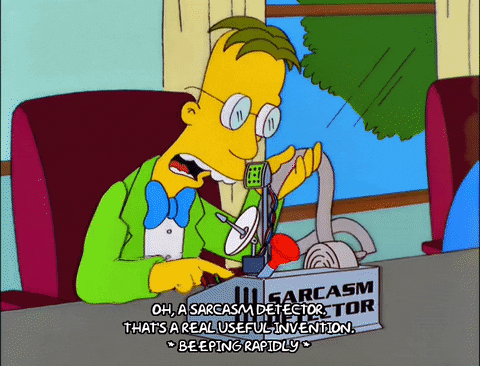An entire feature on sarcasm? Oh, yeah, that's a GREAT idea
Well, okay, actually it is. We asked Jonathan Self to write it — and to pick out his favourite examples from history.


Have you noticed how nice everyone has become? We were already suffering from a surfeit of political correctness — now, we can’t even be critical. Organisations, businesses and people that previously came in for a good deal of adverse comment are to be praised, forgiven or, at the very least, tolerated. Take, for example, Prime Minister’s Questions.
In the past, the combatants could be relied upon for ingenious insults, irony of the heaviest kind and outright rudeness. Recently, it has become more like a church meeting.
According to an aged relative, a similar thing happened during the Second World War. The thinking seems to be that, at a time of national emergency, we must all pull together and not waste time or energy attacking each other. Good manners are, of course, to be applauded, but it is important not to throw out the linguistic baby with the impolite bathwater. In particular, there is a very real risk of losing something at which our island nation has always excelled: the sarcastic riposte.
"The sad, sorry, terrible thing about sarcasm… it is really funny."
To give you a feel for how bad things are, researchers have found that French children can recognise sarcasm from the age of five and Canadian children as young as four are capable of saying, in a withering tone, ‘Smooth move, Mom’ to their mothers when they make a mistake.
To be bested by the French, a nation that revels in derision, is one thing; but by the mild-mannered Canadians? If we aren’t careful, the only country in the world with lower standards of sarcasm will be North Korea, where, in response to large swathes of the population saying ‘This is all America’s fault’ whenever anything went wrong, it has been officially banned since 2016.
Interestingly, Kim Jong-un isn’t the only world leader to worry about the pernicious effects of sarcasm. An Israeli university received government funding to develop, without particular success, software capable of detecting sarcastic reviews of the ‘perfect for insomniacs’ type on Amazon, presumably because some security department thought it might have other applications.
The US Secret Service has openly spent a small fortune trying to separate sarcastic jibes from genuine threats on social media. The latter actually inspired the writers of the TV programme The Simpsons. In one episode, a Prof Frink demonstrates his latest invention: a sarcasm detector. ‘Sarcasm detector? That’s a really useful invention,’ says another character, causing it to explode.
Sign up for the Country Life Newsletter
Exquisite houses, the beauty of Nature, and how to get the most from your life, straight to your inbox.

Perhaps it isn’t surprising that computers can’t detect sarcasm, when one considers how many humans fail at the task. Apparently, the satirical magazine The Onion was deluged by letters of complaint when it announced President Obama’s 2008 victory with the headline: ‘Black Man Given Nation’s Worst Job’.
The problem is that sarcasm is a sort of true falsehood. Its art lies in disguising hostility under cover of friendliness and in saying the opposite of what one really means. The dictionary defines it, somewhat weakly, as ‘a form of verbal irony that is typically bitter and directed at a particular group’.
The real clue to its power, however, lies in its origins, for the word itself actually comes from the Greek sarkasmos, meaning to ‘tear flesh, bite lip in rage, sneer’. For this reason, it is best employed on people with whom one has a close and trusting relationship. Indeed, it’s an excellent way of toning down criticism and of expressing disappointment. It serves many other useful purposes, too, not least making people laugh. As Brandon Sanderson said: ‘The sad, sorry, terrible thing about sarcasm… it is really funny.’
"I like your opera. I think I will set it to music" — Ludwig van Beethoven
It also has the ability to persuade people to alter their behaviour. ‘Men have been laughed out of faults,’ Francis Hutcheson pointed out 300 years ago, ‘which a sermon could not reform.’ According to scientists, sarcasm exercises the brain, encourages problem-solving skills and promotes creativity. Incidentally, an inability to recognise or deliver sarcastic quips is often an early indicator of brain disease.
These isles have a long and enviable tradition of sarcasm. Chaucer employed it and so did Shakespeare. Oscar Wilde, responsible for some of the best sarcastic putdowns of the 19th century, wrote plays full of memorable one-liners. The sweetly sarcastic exchange between Cecily and Gwendolen over afternoon tea in The Importance of Being Earnest is a sublime example of the art.
Nor have more modern British writers let us down. From Yes, Minister (Sir Humphrey: ‘Yes, but now he wants to introduce his next idea.’ Sir Arnold: ‘A minister with two ideas?’) to Harry Potter (‘“Listening to the news! Again?” “Well, it changes every day, you see,” said Harry’), we have proved we have what it takes.
Even our footballers have done their bit: both Wayne Rooney and David Beckham have been sent off the pitch for sarcastic slow clapping when they disagreed with a referee’s decision.
Clearly, it is our patriotic duty to make sure that Britain continues to be laughed at on the world stage. Each of us must use sarcasm whenever the opportunity presents itself. However, a word of caution. Employed incorrectly, it can make one look something of a twit.
Terry Eagleton tells the story of a ‘friend’ who was driving too fast in the west of Ireland when he was stopped by a policeman. ‘What would you do,’ the officer asked him, leaning ominously into the driver’s window, ‘if you were to run into Mr Fog?’ The ‘friend’, annoyed by the officer’s patronising tone, replied with heavy sarcasm: ‘Well, I guess I’d put Mr Foot on Mr Brake.’ Whereupon the policeman looked at him strangely and growled: ‘I said mist or fog.’
10 of the best withering quips through the ages
‘It’s been many years since I had such an exemplary vegetable’ — Jane Austen
‘I like your opera. I think I will set it to music’ — Ludwig van Beethoven
‘I think it would be a good idea’ — Mahatma Gandhi, when asked: ‘What do you think of Western civilisation?’
‘I am enclosing two tickets to the first night of my new play; bring a friend—if you have one’ — Bernard Shaw to Winston Churchill ‘Cannot possibly attend first night; will attend second — if there is one’ — Churchill’s response
‘About half’ — Pope John XXIII, when asked: ‘How many people work in the Vatican?’
‘The thing that impresses me most about America is the way parents obey their children’ — Edward VIII
‘She’s the sort of woman who lives for others — you can tell the others by their hunted expression’ — C. S. Lewis
‘What were you expecting to see out of a Torquay hotel bedroom window? Sydney Opera House perhaps? The Hanging Gardens of Babylon? Herds of wildebeest sweeping majestically by…?’ — Basil Fawlty (as played by John Cleese) when a difficult guest complained about the view
‘He inherited some good instincts from his Quaker forebearers, but by diligent hard work, he overcame them’ — James Reston on Richard Nixon
Instant sarcasm for beginners
Not good at quick repartee? Try one of the phrases below. And if words fail you, just clap — slowly, of course.
- Big deal
- My heart bleeds for you
- Brilliant
- Excuuuuuse me
- Thank yoooooou
- That was really clever
- Too bad
- My hero
- That’s all I need
- What a surprise

Credit: Alamy
10 terrible but terribly funny school reports of the world famous, from Einstein to Churchill
Jonathan Self picks out 10 of his favourite bad school reports of all time, and laments the fact that the
After trying various jobs (farmer, hospital orderly, shop assistant, door-to-door salesman, art director, childminder and others beside) Jonathan Self became a writer. His work has appeared in a wide selection of publications including Country Life, Vanity Fair, You Magazine, The Guardian, The Daily Mail and The Daily Telegraph.
-
 A rare opportunity to own one a family home on Vanbrugh Terrace, one of London's finest streets
A rare opportunity to own one a family home on Vanbrugh Terrace, one of London's finest streetsThis six-bedroom Victorian home sits right on the start line of the London Marathon, with easy access to Blackheath and Greenwich Park
By James Fisher
-
 Materials, textures, construction, expression: A Brutalist watch on your wrist
Materials, textures, construction, expression: A Brutalist watch on your wristLuxury watchmakers are seeking to bridge the gap between two contrasting styles, with exciting results.
By Chris Hall